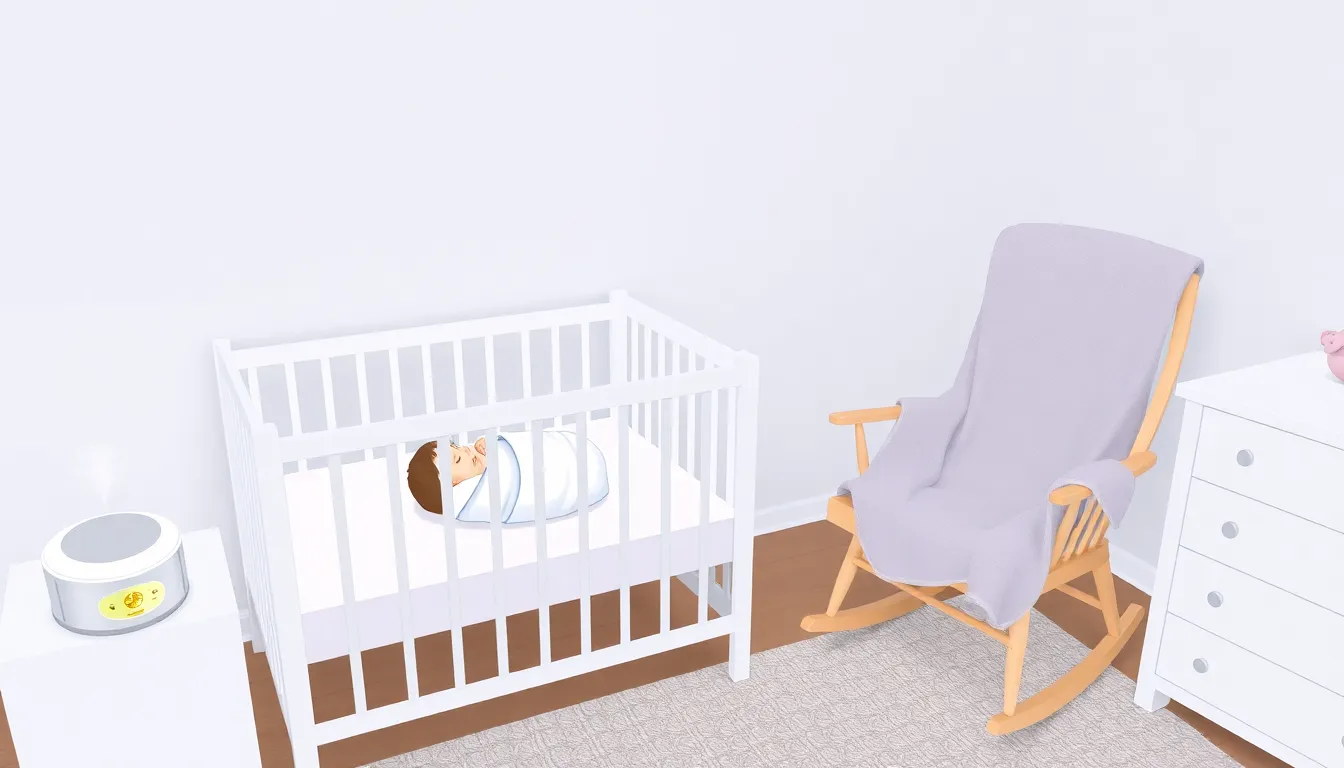Table of Contents
ToggleGetting a baby to sleep can feel like trying to solve a Rubik’s Cube blindfolded. Parents often find themselves in a whirlwind of sleepless nights and endless rocking, wondering if they’ll ever get a moment of peace. The truth is, baby sleep doesn’t have to be a mystery wrapped in a swaddle.
Understanding Baby Sleep Patterns
Understanding baby sleep patterns simplifies the process of helping infants rest better. Sleep is vital for growth, development, and overall health.
Importance of Sleep for Infants
Sleep plays a crucial role in an infant’s physical and mental development. Research indicates that babies require 14 to 17 hours of sleep per day during their first few months. Adequate sleep supports brain development, enhances immune function, and promotes emotional well-being. During deep sleep, the body releases growth hormones, contributing to size and strength. Lack of sleep can lead to fussiness, difficulty in learning, and impaired cognitive function. Prioritizing a baby’s sleep directly impacts their long-term health and growth.
Common Sleep Challenges
Infants experience several sleep challenges that can disrupt their rest. Frequent waking occurs due to hunger, discomfort, or the need for reassurance. Some babies may struggle with transitioning between sleep cycles, leading to disrupted sleep. Environmental factors, like noise and temperature, significantly influence sleep quality as well. Parents also face challenges when establishing a consistent bedtime routine. Colic and teething can further complicate sleep, leaving families feeling exhausted. Understanding these common issues can aid in finding effective sleep solutions.
Popular Baby Sleep Solutions

Parents often explore various methods to help their babies sleep better. The following solutions provide effective ways to address common sleep challenges.
Swaddling Techniques
Swaddling creates a cozy environment for infants. By wrapping a baby snugly in a light blanket, it mimics the warmth and security of the womb. This technique can help reduce startle reflexes that disrupt sleep. Ensure the swaddle allows for hip movement to prevent hip dysplasia. Parents often find that swaddled babies drift off to sleep more easily, leading to longer sleep durations.
White Noise Machines
White noise machines produce soothing sounds that mask disruptive noises. These sounds can replicate the environments babies are accustomed to, promoting relaxation. Many parents report faster sleep onset when using these devices. Various types of noises, such as gentle rain or ocean waves, cater to different preferences. Optimal placement near the crib enhances effectiveness while maintaining safe sound levels for a restful sleep environment.
Sleep Training Methods
Sleep training equips infants with skills to self-soothe and fall asleep independently. Numerous methods exist, including the Ferber method and the chair method. Consistent routines play a crucial role in reinforcing these skills. Parents may implement timed intervals of checking on the baby, allowing the child to learn to settle themselves gradually. Achieving long-term sleep success often involves patience and consistency from caregivers.
Natural Remedies for Better Sleep
Natural remedies can effectively support better sleep for infants. Exploring herbal teas and consistent bedtime rituals makes a significant difference.
Herbal Teas and Supplements
Chamomile and lavender are popular herbal teas, known for their calming properties. Parents often consider these options for their soothing effects on babies. Some parents opt for herbal supplements that promote relaxation and ease restlessness. Consultation with a pediatrician is essential before introducing any new products, ensuring safety and appropriateness for the baby’s age. Studies indicate that these natural solutions can enhance sleep quality, creating a more restful environment for infants.
Bedtime Routines and Rituals
Establishing a consistent bedtime routine helps signal to infants that sleep is approaching. Engaging in calming activities, like reading or gentle rocking, fosters an environment conducive to sleep. Dimming the lights and reducing noise creates a relaxing atmosphere, supporting a smooth transition to slumber. Incorporating warm baths before bedtime may also promote relaxation, enhancing the routine’s effectiveness. Consistency in these rituals builds comfort and predictability, leading to more restful nights for both the baby and parents.
Consultations with Pediatricians
Consulting a pediatrician helps address baby sleep concerns effectively. By seeking professional guidance, parents can gain valuable insights tailored to their child’s unique needs.
When to Seek Professional Help
Parents should consider professional help if their baby struggles to sleep for extended periods. Frequent nighttime awakenings beyond the first few months often warrant a discussion with a pediatrician. Signs of excessive fatigue or irritability may indicate underlying issues that require medical attention. Persistent colic or signs of reflux can also disrupt sleep. Parents should monitor sleep patterns closely and seek advice when worries arise. Consultation ensures that any potential health concerns receive proper evaluation and management.
Questions to Ask Your Pediatrician
Questions can guide parents toward better sleep solutions for their infants. Asking about age-appropriate sleep expectations can set realistic goals. Inquiries about safe sleep practices, including crib guidelines and sleep positioning, offer essential safety information. Discussing the benefits and timing of sleep training methods may provide clarity on the best approaches for specific situations. Parents should also ask about natural remedies or products that may support sleep. Clarifying any concerns about environmental factors that could affect sleep quality is crucial for a comprehensive understanding.
Finding effective baby sleep solutions can transform the experience for both infants and parents. By understanding sleep patterns and implementing strategies like swaddling and white noise, caregivers can create a soothing environment that promotes better sleep. Establishing consistent bedtime routines not only signals to babies that it’s time to sleep but also fosters a sense of security.
Consulting with pediatricians adds an extra layer of support, ensuring that any sleep concerns are addressed appropriately. With patience and the right tools, parents can navigate the challenges of baby sleep and enjoy more restful nights. Prioritizing sleep is essential for a baby’s growth and well-being, making it a worthwhile investment for families.







